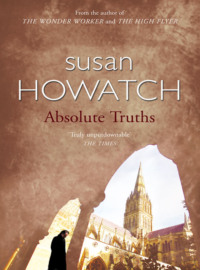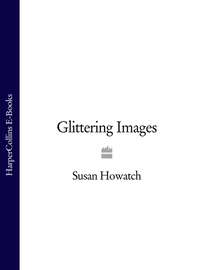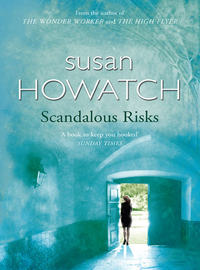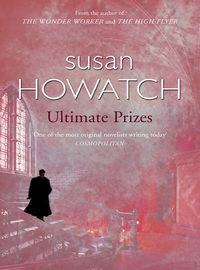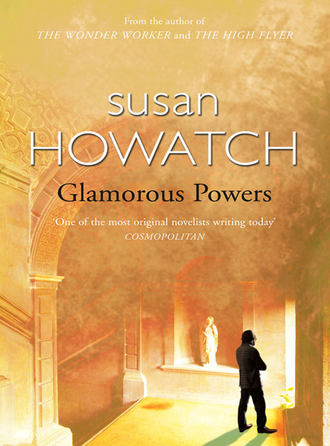
Полная версия
Glamorous Powers
‘Yes, Father.’
‘Jonathan, doesn’t it occur to you that this humourless docility is the height of veiled insolence? I detest it – the least you could do to placate me would be to smile at my witty remarks!’
‘What witty remarks, Father?’
‘Very funny. All right, get out. The Lord Abbot-General is quite definitely not amused.’
VI
‘Curiosity stirred in my mind this morning, Jonathan, and it occurred to me to wonder what you’ve been doing since we last met four days ago. Any more enthralling psychic dramas?’
‘No, Father. I’ve been helping Edward to make an altar-table.’
‘Maybe I can solve your entire problem by ordering you to remain here as a carpenter. Obviously the strain of being an abbot sent you off your head.’
‘Naturally I shall obey any order you care to give me, Father.’
Francis made a noise which sounded like ‘Arrrgh!’ and slumped back in his chair. ‘Very well, Jonathan, let’s have a truce. Sit down.’
Once more we sat facing each other across his desk. I was beginning to feel tense again although the relaxation provided by the carpentry had strengthened me mentally, just as Francis had no doubt intended; a nervous collapse would only have made the task of discernment more protracted. Perhaps he had also intended to strengthen me mentally by severing me from the outside world; I had received no invitation to ‘listen in’ to the wireless which had finally been acquired to give him immediate news of the continuing crisis, and I had been granted no access to The Times. However fortunately for my sanity the monastic grapevine was active. The postman and the milkman were clay in the hands of the doorkeeper, who with impressive journalistic skill jotted down a few pertinent sentences and delivered the scrap to the kitchens. It usually reached the workshop shortly before the office at noon.
‘I’ve reached the conclusion that we must make a completely different approach to this problem of yours,’ Francis was saying. ‘As things stand we’re now firmly entrenched behind fixed positions and no further progress is possible, so we must abandon our survey of the recent past, I think, and turn to the more distant past in our quest for enlightenment.’
Dutifully I said: ‘Yes, Father,’ and assumed an interested expression.
‘What I now want to do,’ pursued Francis, changing the nib of his pen, ‘is to compare your new alleged call to leave the Order with your old call to enter it and uncover the common denominators.’
I was sufficiently startled to exclaim: ‘But there aren’t any!’ However I added at once: ‘I’m sorry. That’s not a helpful attitude and I must do my best to be more constructive.’
Francis said after an eloquent pause: ‘Thank you, Jonathan.’ Throwing the old nib in the wastepaper basket he dipped his pen in the ink and wrote at the top of a new page of foolscap: ‘THE CALL TO BE A MONK’. Then he undid the ribbon which bound my file and opened the folder to reveal the earliest entry.
‘The first point of interest about your original call,’ he said, ‘is that it’s poorly recorded, but I suspect I know why. You were accepted as a postulant by your predecessor in the Abbot’s chair at Grantchester, and we all know now that dear old James Reid, God rest him, was so soft-hearted that he welcomed into the Order almost anyone who knocked on his door. I’d wager your call was never comprehensively investigated. In the end that didn’t matter, since your call was genuine, but no doubt when you quickly became so disruptive poor James thought he’d made a disastrous mistake.’
I felt obliged to say: ‘He did stand by me – even when I came to blows with the Master of Novices James resisted the demands that I should be thrown out. When he called in Father Darcy it wasn’t because he wanted to get rid of me but because he thought the poltergeist activity demanded a first-class exorcist.’
‘How Father Darcy must have enjoyed himself! But as soon as he met you, he knew James was right about your potential, didn’t he? So he didn’t investigate your call in detail either. He was much too busy shaping your future to waste time burrowing into your past.’ Francis picked up a page from the file and added: ‘Let me read you part of James’ opinion recorded after his preliminary interview with you in 1923 when you were still outside the Order. He writes:
‘“Jon tells me that he’s wanted to be a monk ever since his wife died in 1912. He loved his wife very dearly and they had nine happy years of marriage which were blessed by the gift of two children: Ruth (born 1904) and Martin (born 1905). Jon is clearly devoted to his children and during the eleven years since his wife died he has worked hard to support them even though his call to the cloister was becoming increasingly strong. He tells me that despite his happy marriage he realized that a life of domesticity, charming and rewarding though it might be in many ways, proved difficult to combine with his unusual and distinctive spirituality, and when his wife died he knew he must remain celibate in order to serve God best. He is also convinced that in the world he will always be tormented by the temptation to marry to satisfy his carnal inclinations, and he believes that only in a monastery will he be able to serve God without distraction and develop his spiritual gifts to the full. In my opinion he is patently sincere, mentally well-balanced despite his psychic powers and is obviously a man of high intelligence and considerable pastoral ability. In the past he has been led astray by a desire to exploit the glamour inherent in those psychic powers, but I believe that with sufficient training and dedication a truly charismatic power can be developed for the service of God. I told him I would accept him as a postulant, and I believe that in time he will prove a considerable asset to the Order.’”
Francis closed the file. For a long moment we looked at each other in silence. Then he said mildly: ‘Jonathan, I don’t want to appear cynical but it sounds to me as if you manipulated that unworldly man with all the skill your “glamorous powers” could command. During those nine years of happy marriage, what exactly happened which made you feel the trip to the altar was the one journey you never wanted to repeat?’
VII
‘James spells out the truth clearly enough,’ I said. ‘I came to realize that despite my successful marriage I could serve God best without the distraction of family life.’
‘But was your marriage really so happy as James apparently believed it was?’
‘No, of course not. My marriage was like the vast majority of marriages; sometimes it was heaven and sometimes it was hell. Betty and I enjoyed the heaven, survived the hell and on the whole rubbed along very tolerably together. I certainly felt I was entitled to present the marriage to James as a success.’
‘Tell me about the times when the marriage was hell.’
‘You’re most unlikely to understand how unimportant our difficulties really were. If you’d ever been married yourself –’
‘Oh, good heavens!’ Francis was suddenly at his most theatrical. He groaned, shaded his eyes with his hand and twisted his mouth into a mournful grimace. ‘I did hope I’d never hear a monk of your calibre try to trot out that hoary jibe of the snide layman. If you’re not careful you’ll drive me to trot out the equally hoary jibe of the Roman Catholic priests that the onlooker sees most of the game.’
Despite my tension I laughed and apologized.
‘I can see I must tiptoe up to this delicate subject by another route,’ said Francis. ‘How did you meet your wife?’
‘After I was ordained in 1903 I went to work at the Mission for Seamen in Starmouth, and a week later I met Betty in the park. She saw me, failed to look where she was going and stumbled over a patch of uneven ground. Naturally I rushed to assist her.’
‘Just like a romance from Mudie’s Library. What was her background?’
‘Her father owned a tobacconist’s shop.’
‘Dear me, how awkward! What did your schoolmaster father think of your desire to marry below your station?’
‘How could he complain? He’d married a parlourmaid – as Father Darcy never ceased to announce to all and sundry whenever he wanted to rub my nose in the mud and induce a spirit of humility.’
‘Am I to deduce that you married a working-class woman because you wanted a wife who was just like your mother?’
‘No, you can forget your obsession with Freud and deduce that I married a working-class woman because I couldn’t afford to marry a lady on my modest salary as a chaplain.’
‘If you had no private means I’d have thought that any marriage would have been out of the question for a young man of twenty-three. Surely your father advised you to wait!’
‘My father was a quiet scholarly man who didn’t find it easy to talk to me – indeed I both mystified and frightened him. His predominant reaction to my desire to marry seemed to be relief that I wanted to settle down.’
‘And your confessor – who, of course was none other than dear old James himself at our recently-founded Grantchester house – what did he think of your decision?’
‘He was the one who urged me to marry as soon after my ordination as possible.’
Francis said dryly: ‘It’s amazing how dangerous these unworldly holy men can be. However I mustn’t be too harsh on poor old James – after your shady career at the Varsity I suppose it was inevitable that he should doubt your ability to stay chaste for long … Did you continue to see him regularly between your ordination in 1903 and your entry into the Order twenty years later?’
‘No, there came a point when I realized he was incapable of counselling me, so I decided to dispense with a confessor.’
‘You mean you had no direction at all?’
‘Oh, I was never completely adrift! I always had some older priest with whom I could discuss spiritual matters but I never made a formal confession and I never talked in detail about my private life.’
‘In other words you abandoned Anglo-Catholicism.’
‘Not entirely. It was easy enough to drift back into the fold later when I realized I wanted to be a monk. I never lost my admiration for Bishop Gore and the High-Church party.’
‘What was the matter on which James failed to give you acceptable counsel?’
‘Contraception.’ I hesitated but when Francis merely waited I said: ‘Betty could barely manage two children under two. The strain was affecting her health as well as our marriage, and when she threatened to seek an abortion if she became pregnant again I saw contraception as the lesser of two evils.’
‘Meanwhile James, I suppose, had told you to behave like a eunuch. How far were you able to share the spiritual aspects of this dilemma with your wife? Was she devout?’
‘No. She believed in God as children believe in Father Christmas – with a mindless innocence. Religion for her was little more than a charming superstition.’
‘How very difficult for you!’
‘Not at all,’ I said at once. ‘She supported me by coming to church on Sundays and she was very good in bed. What did I have to complain about?’
‘Well, Jonathan, I’m just an ignorant old bachelor, as you tried to tell me a moment ago, but I seem to remember hearing somewhere that there should be more to marriage than sexual intercourse and I’m quite sure there should be more to being a clergyman’s wife than turning up in church on Sundays. Tell me, was your wife intelligent?’
‘No, she was really rather stupid. But that didn’t matter. I prefer to discuss intellectual matters with men, and anyway when a man gets home after a hard day’s work the last thing he wants is to hear his wife expounding on intellectual or spiritual matters. He wants a kiss and a hot meal and the latest report on the domestic front, preferably the more banal the better.’
‘The wife you’re describing seems to be little more than a housekeeper,’ said Francis. ‘Or is it a glorified parlourmaid?’
‘If you’re still clinging to the theory that I wanted to marry a woman just like my mother, I assure you that you couldn’t be more mistaken! Betty and my mother were utterly different.’
‘Tell me about this mother of yours. Were you the only child?’
‘Yes, but she didn’t spoil me. She trained me much as she used to train her cats – firmly and without sentimentality.’
‘How old were you when she died?’
‘Fourteen. Can we stop this digression now, please, and return to more relevant matters?’
‘Why are you becoming so flustered about your mother?’
‘I’m not flustered! It’s just that one doesn’t always welcome the opportunity to share cherished memories, particularly if one’s in the middle of an inquisition. Why are you so obsessed with the Oedipus Complex?’
‘You don’t ask the questions, Jonathan; you answer them. Why do you suppose you married a woman who was so utterly different from your mother?’
Losing patience I said with sarcasm: ‘No doubt you’d advance the theory that when I failed to find my mother’s replica among the women I met through my Cambridge acquaintances, I married my mother’s opposite in despair.’
‘Never mind the theory I’d advance. Let’s hear you advance a theory of your own.’
‘I don’t have a theory; I have knowledge. I married Betty because I loved her and although the marriage had its difficult aspects I must absolutely insist that it was happy and successful.’
‘But my dear Jonathan,’ said Francis, ‘can’t you see that you’re trying to harmonize two statements which are fundamentally incompatible? On the one hand you’re insisting that you were happily married – yet on the other you’re insisting that the marriage made you so maimed spiritually that you were unable to serve God to the best of your ability. I put it to you that either you were happily married and not spiritually maimed; or that you were spiritually maimed and unhappily married. But a priest like you can’t possibly be both spiritually maimed and happily married. That would be a psychological impossibility.’ He terminated the interview by laying down his pen. ‘Now go away and consider what I’ve said, please, and when you return tomorrow I trust you’ll be a good deal more explicit about your curious marriage than you’ve deigned to be today.’
VIII
After supper I retired to my cell to examine the new development in my ordeal. I could now perceive the dimensions of the rack, just as I could sense that Francis was steering me towards it, and I knew I had to take defensive action. I felt no guilt in admitting this because I knew Francis was on the wrong track; my duty at this point was clearly not to wave him on his way but to do my best to steer him back on to the right road.
I sat plotting how I might best deflect him and escape the rack. Of course I could not tell lies. I had to be as truthful as possible but that meant I had to calculate with precision where the boundary between the possible and the impossible lay. It would be unfortunate if I were to discover in mid-sentence that I had allowed myself to be strapped to the rack despite all my efforts to avoid it.
I saw then that the next interview would be fraught with danger, and on the following morning in the workshop I barely glanced at the doorkeeper’s daily news. The war beyond the cloister was receding in my consciousness. I was too busy fighting a desperate private war of my own.
IX
‘I’m sorry you thought I was being so paradoxical yesterday,’ I said to Francis when we next met. ‘With your permission I’d now like to explain my marriage in a more comprehensible way.’
Francis kept his expression bland and motioned me to continue.
‘What I was really trying to imply,’ I said, ‘is that I was probably as happy with Betty as I would have been with any other woman. The problem wasn’t Betty; it was marriage itself – the whole business of living in close proximity to another person. The truth was I shouldn’t have married at all, but as I was neither a eunuch nor a homosexual it never occurred to me at the tender age of twenty-three that I’d be better off as a celibate. So I married and was often very happy. It’s true that I did find my spiritual vitality was being sapped, but since I loved my wife and children I was prepared to tolerate that. All marriages involve some degree of compromise and mine was certainly no exception.’
But Francis merely said: ‘I do see the distinction you’re trying to make when you blame your discomfort on the institution of marriage rather than on your wife, but nevertheless if living in close proximity to another person was so difficult for you one can’t help but wonder if that other person might be part of the problem. Forgive me for asking, but did you in fact marry her for any reason other than the sexual and the economic?’
‘No, but that doesn’t mean the marriage was doomed. Most marriages founder over either money or intimacy. It was our modest bank balance and our intimate relationship which held the marriage together.’
‘Well, there wasn’t much else to hold it together, was there?’ said Francis bluntly. ‘She shared none of your intellectual interests; she was spiritually illiterate; she came from a different class, a fact which must have complicated your professional and social life in all kinds of difficult ways –’
‘But I’ve told you – I didn’t care about any of those disadvantages! All I wanted was a morally acceptable outlet for my sexual inclinations –’
The trap sprang shut.
‘How very humiliating for your wife,’ said Francis brutally, and at once I was slammed on the rack.
X
Francis saw his shot had hit the mark and allowed me no time to regain my equilibrium. ‘Tell me more,’ he said, ‘about how unsuited you were for matrimony. I can quite believe that an immature young man who treats his wife merely as a cheap sexual receptacle would make a far from ideal husband.’
I tried to devise a strong response but I was unable to think clearly. I began to twist my abbot’s ring round and round on my finger.
Francis said briskly: ‘The truth is, isn’t it, that you made each other very miserable. When did you first realize you’d made a mistake?’
‘You’re completely misrepresenting the situation –’
‘How can I be when you admit marriage left you cold?’
‘It didn’t leave me cold. It left me deprived of psychic space. That’s different. It wasn’t Betty’s fault. As I keep telling you, it was marriage, not Betty, that made me unhappy.’ I had stopped twisting my ring but my fingers were tightly interlocked. ‘Even before I entered the Order,’ I said, ‘I needed a great deal of time alone in order to meditate and pray, and frankly I had no idea that the daily routine of marriage would be so hostile to any attempt to sustain a rich inner life. Nothing had prepared me for such chaos. My parents were quiet people; our home was very orderly, very peaceful, very conducive to developing a talent for using solitude constructively. But as soon as I married I found myself in a different atmosphere. Betty was seldom still. She was always rushing hither and thither, continually invading my psychic space, laughing, crying, endlessly chattering … And then the children came. Of course I was pleased and proud, but the noise, the mess, the constant destruction of any interlude which encompassed peace and order –’
‘You were born into the wrong class, Jonathan. My parents cheerfully abandoned their children to nannies and governesses and enjoyed numerous delightful interludes with their lovers.’
‘My dear Francis!’
‘Will you kindly stop trying to undermine my authority by addressing me by my Christian name?’
‘I’m sorry, but I was so appalled by your light-hearted attitude to such adulterous irresponsibility –’
‘Good heavens, can’t you see I was trying to signal my sympathy to you by making a joke about my own melancholy experience of family life? No, obviously you can’t and I must apologize. I shouldn’t have forgotten how sensitive you are on the subject of class … But let’s return to your marriage. You’ve admitted you were in a situation which would have driven me, if not you, to drink. How did you make life bearable for yourself?’
The rack creaked. Once more I found myself groping unsuccessfully for a strong response.
‘Come along, Jonathan! Obviously you had to take drastic measures to preserve your sanity –’
‘I volunteered for service at sea.’
‘What a brilliant solution! But didn’t the authorities try to tell you that a married chaplain should remain ashore with his family at the Naval base?’
‘I talked them out of that. I said I’d been called to serve on board ship. I was very convincing.’
‘And how did your wife feel about being abandoned?’
‘She was no more abandoned than any other Naval wife! Anyway I made it up to her – whenever I came home our reunion was as good as a honeymoon.’
‘But how did you get on at sea? There was little privacy and peace, surely, on board ship –’
‘I had my own cabin. Once the door was closed I had the psychic space I needed and I was happy. That was when I finally faced the fact that I couldn’t serve God properly as a married man, yet on the other hand –’
‘– on the other hand you had a wife and two children and no doubt you still couldn’t imagine giving up intimacy entirely. What an exceedingly difficult spiritual position! You led this divided life, you had no adequate spiritual direction, you must have become increasingly isolated –’
‘But I’m a psychic! I was used to isolation, used to no one understanding, used to struggling unaided with my problems –’
‘Nevertheless what a relief it must have been when she died!’
Silence fell after this ultimate turn of the screw. My psyche, jarred and jolted by the rack, flashed a warning to my brain that the strain was proving too much but before I could stop myself I was saying: ‘It was terrible when she died. Terrible. If you think I was glad you couldn’t be more wrong.’
‘The dark side of bereavement lies in the guilt beneath the grief.’
‘Why should I have felt guilty? She loved me, I did everything in my power to make her happy –’
‘You’re wonderfully convincing, Jonathan, and I can almost smell the red roses and hear the Strauss waltz, but unfortunately my sceptical streak means that I have a deep-rooted resistance to romantic fantasies. However I’m always willing to listen. Come back tomorrow and spin me another romantic fantasy about your chaste life as a widower.’
I stared at him. He stared back. I was acutely aware of my file bulging on the desk between us.
‘Francis, I really can’t see what relevance such a conversation can possibly have to my present predicament –’
‘It’s my business to see the relevance, not yours – and for heaven’s sake stop calling me Francis! That’s a privilege I’ll allow you if you ever leave the Order but meanwhile I’m your superior and I don’t want either of us to forget for one moment that I’m responsible for the care of your soul …’
XI
I dreamt about Hilda that night. In my dream she was committing suicide by hanging herself, but I was bound hand and foot, unable to save her. She was hanging herself on the gallows of the prison where I had worked as a chaplain, and as I watched the body twitching on the end of the rope I realized that I was lying in a pool of blood.
‘You look a trifle pale,’ said Francis when I returned to his room the following afternoon. ‘I was sorry to see when I passed your door at three o’clock this morning that your light was on.’
‘Why were you spying on me at three this morning?’
‘Why should you automatically assume I was spying on you? What vanity! As it happens, I was summoned to the infirmary to attend to my poor little novice who hears voices. I’m afraid his place is in a hospital, not a monastery.’


